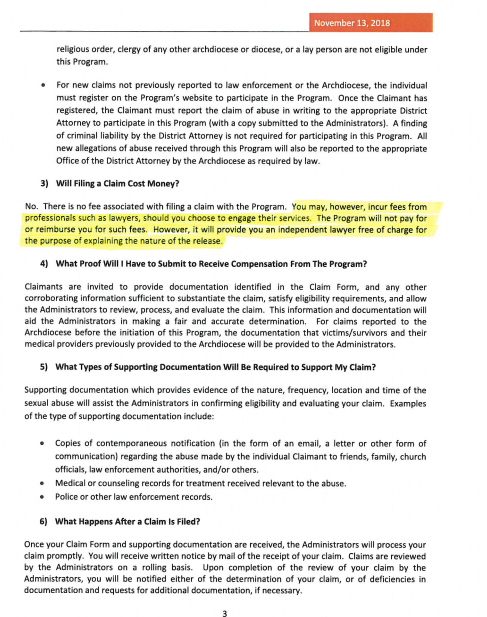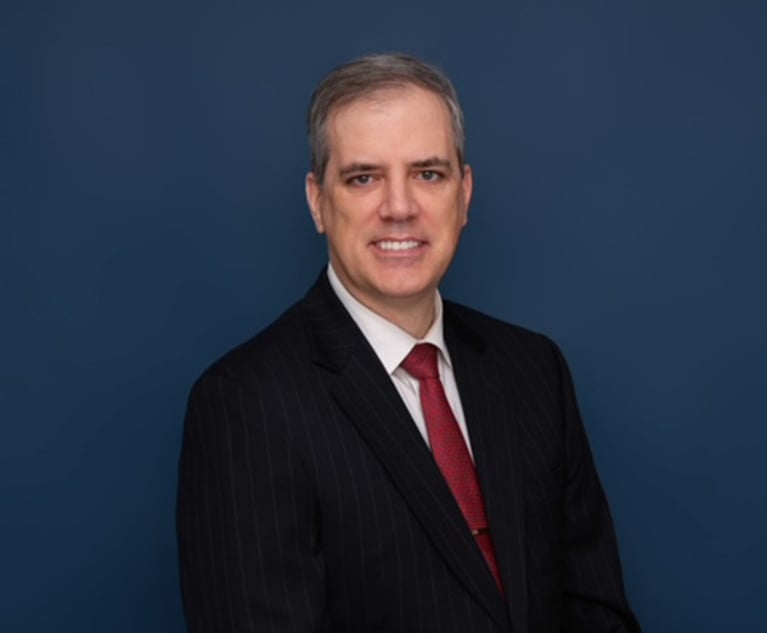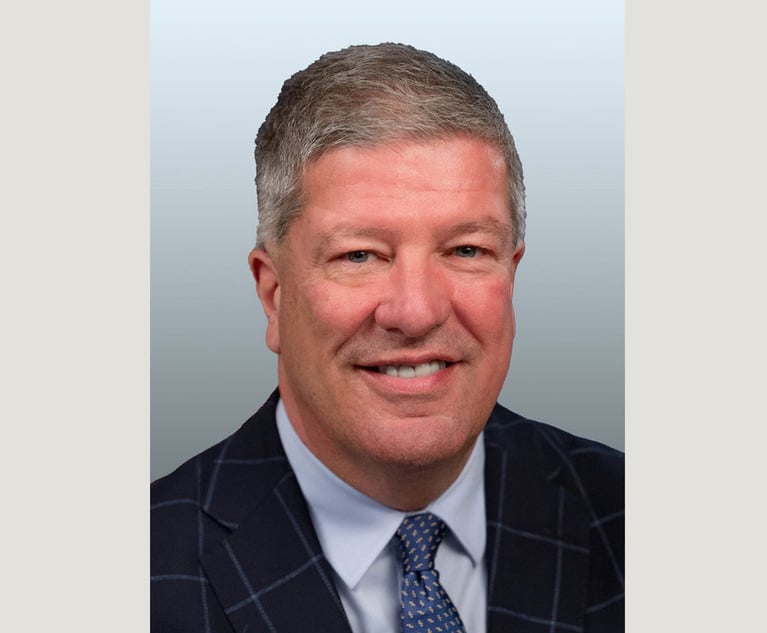Attorneys Accuse Archdiocese of Sowing Confusion About Victim Compensation Fund
The Archdiocese of Philadelphia's compensation fund for victims of childhood sexual abuse has been lauded by many as a step in the right direction for survivors who face long odds when it comes to getting their day in court. But several attorneys said they are concerned about the fund's impact on access to justice.
December 11, 2018 at 03:18 PM
9 minute read
 Photo: Shutterstock
Photo: Shutterstock
The Archdiocese of Philadelphia's compensation fund for victims of childhood sexual abuse has been lauded by many as a step in the right direction for survivors who face long odds when it comes to getting their day in court.
But several attorneys said they are concerned about the fund's impact on access to justice. They said they believe informational packets sent out to potential claimants about the program have sown confusion among their clients about whether claimants should have legal counsel if they seek compensation through the fund.
One attorney even said his clients told him that at least one diocese representative actively discouraged them from seeking legal advice.
“It's obviously unsettling to us,” Williams Cedar attorney Gerald Williams said. “We don't think the church of all places should be giving that advice.”
The Independent Reconciliation and Reparations Program is being administered by Camille Biros, who has worked as a claims administrator for compensation programs for the victims of clergy sex abuse in New York, and Kenneth Feinberg, who has been involved with numerous compensation funds, including those stemming from the Sept. 11, 2001, terrorist attacks and convicted serial child molester Jerry Sandusky.
Biros, in an interview Monday, said the program does not discourage any potential claimant from seeking or having an attorney. Biros noted that claimants who receive money through the compensation fund would waive their right to sue the church, even if window legislation is later passed. Because of this, she said, the administrators offered counsel to help claimants understand the waiver in an effort to make sure claimants fully understand all the ramifications of taking an award.
“They're not there to give advice about whether they should accept it, or whether the amount of money is sufficient,” she said. “They're simply there so the individual knows that once they sign it, they can no longer sue.”
In an emailed statement, Kenneth Gavin, spokesman for the Archdiocese of Philadelphia, emphasized that the compensation fund is a completely separate entity from the Catholic archdiocese.
“What I can say with certainty is that the [Independent Reconciliation and Reparations Program] is entirely separate from archdiocesan jurisdiction. As such, archdiocesan officials are not involved with the claims filing process,” he said in a statement.
Gavin also said he would need more specific information in order to respond to any claims about archdiocesan representatives discouraging claimants from obtaining counsel.
“No one is seeking to supplant existing legal counsel that a victim may retain, neither is anyone discouraged from utilizing their legal counsel. Those decisions are at the discretion of the individual victim,” Gavin said in the statement.
Although no other attorney said they had been told by clients that they were actively discouraged from seeking counsel, several lawyers said there was confusion among their clients about whether they should be represented by an attorney if they go through the claims process.
(An excerpt from the claims protocol.)
Of particular concern, attorneys pointed to language in an explanation packet sent to claimants last month that said an attorney would be provided to claimants through the program, if they chose. Attorneys also contended that nothing in the literature advised that the program is an adversarial process, or that claimants should have an individual attorney.
“The idea that they are going to offer someone an attorney from the fund, paid through this fund … is to me rife with conflicts, and is completely against the way claims are handled in our system,” Kline & Specter attorney David Inscho, who is actively representing clients with claims against the diocese, said.
Attorneys were also critical of language in the claim form, which said claimants should attach their retention agreements to prove they have outside legal representation.
(An excerpt from the claims form.)
Lawyers, including McLaughlin & Lauricella attorney Slade McLaughlin, who has represented child sex victims with claims against the Philadelphia Archdiocese, also said they were troubled that the diocese reached out to potential claimants directly before the fund was publicly announced, even when those claimants had attorneys. He also said he did not receive any advanced notice that the compensation fund was being established.
“This is an attempt, I think, to cut out the lawyers,” McLaughlin said. ”Lawyers are going to dig deeper. They're going to want more.”
Marci Hamilton, founder and CEO of Child USA, a nonprofit that analyzes the impact of laws affecting survivors of childhood abuse, was largely positive about the victim compensation programs that diocese across the state announced in November. However, she said she has gotten calls from numerous survivors who said they were confused about whether they should retain counsel if they want to seek compensation through the fund.
“The one misstep that I think has been made is the suggestion to the vulnerable survivors, who, many of them are exhausted, that they should go forward without a lawyer,” Hamilton said. “It's unfortunate and arrogant.”
Although there are similar victim compensation funds outside Pennsylvania, Hamilton said, complaints about confusion regarding whether to retain counsel seem to mostly be coming from the Philadelphia region.
Hamilton said potential claimants should know that the program is still an adversarial process, and, without legal representation, claimants will likely be unfamiliar with assessing, or calculating damages. She noted that, due to the nature of trauma, severity of abuse does not always mean more severe damages. A child abused only once could end up with a severely dysfunctional life, whereas a child who was serially abused, but lived in a supportive environment, could be much less impacted several years later, she said.
“It's not that cut-and-dried,” she said. “The cases need to be assessed on a person-by-person basis.”

(An excerpt from the Frequently Asked Questions.)
In early November, the Archdiocese of Philadelphia announced a plan to establish the IRRP, part of which would include a committee of heavyweights from the Pennsylvania legal community to help ensure the program is autonomous from the church.
The announcement came three months after the August release of an explosive report from a grand jury outlining decades of sex abuse at dioceses across the state. The report sparked numerous similar investigations across the nation, and kickstarted an ultimately unsuccessful effort to pass a law in Pennsylvania that would allow victims of childhood sex abuse to sue their perpetrators outside the statute of limitations.
IRRP administrator Biros noted that, in the programs she administered in New York, about 57 percent of claimants are represented by counsel.
She said the initial contact was done through the church, not the program, but, as claimants begin to notify the program about whether they are represented, the administrators are updating the list of claimants to reflect whether they are represented by counsel. Where a claimant has an attorney, Biros said, the program deals only with counsel and not the claimants directly.
Biros also said the reason the program asks claimants to submit their retention agreements is to prove they are actually being represented. Attorneys, she said, are free to redact any information outlining their fee arrangement.
“We're not interested in that,” she said.
Biros said the program has been contacted by many attorneys, but she had not heard about the claims of confusion. She also said she would be “skeptical” about the charge that a diocesan representative has discouraged claimants from seeking counsel.
According to Biros, more than 35 claims have come in since the program was announced.
“All the claims, whether they're represented or not, will be treated in exactly the same manner,” she said.
In response to concerns about contacting claimants directly, Gavin, the Philadelphia Archdiocese spokesman, said it was important to initiate the contact directly with potential victims.
“As this is an entirely new mode of support, and one entirely free from church jurisdiction, it was important for the archdiocese to contact victims directly to share the information,” Gavin said in a statement.
Overall, Hamilton said she saw the establishment of the fund as a positive move. The administrators, with their history handling other funds, will likely also bring an air of fairness to the proceedings and a willingness to listen to the claimants, she said.
“There are so many claimants who are in a point in their lives where they just don't have what is needed to be able to survive a civil lawsuit. It's stressful going through the civil system,” she said, adding that she still believes there needs to be legislation opening up the statute of limitations.
When it comes to attorneys whose clients might have claims against the church, many said they are taking a wait-and-see approach.
Harrisburg attorney Benjamin Andreozzi said that, while the majority of his clients have been receptive to the fund, some of his clients have no interest.
“These aren't like auto cases where people are simply looking to maximize the compensation they received,” Andreozzi said. “This is a more complex form of justice survivors are trying to obtain.”
This content has been archived. It is available through our partners, LexisNexis® and Bloomberg Law.
To view this content, please continue to their sites.
Not a Lexis Subscriber?
Subscribe Now
Not a Bloomberg Law Subscriber?
Subscribe Now
NOT FOR REPRINT
© 2025 ALM Global, LLC, All Rights Reserved. Request academic re-use from www.copyright.com. All other uses, submit a request to [email protected]. For more information visit Asset & Logo Licensing.
You Might Like
View All


Stevens & Lee Hires Ex-Middle District of Pennsylvania U.S. Attorney as White-Collar Co-Chair
3 minute read
Judge Tanks Prevailing Pittsburgh Attorneys' $2.45M Fee Request to $250K
5 minute readTrending Stories
- 1Decision of the Day: Court Holds Accident with Post Driver Was 'Bizarre Occurrence,' Dismisses Action Brought Under Labor Law §240
- 2Judge Recommends Disbarment for Attorney Who Plotted to Hack Judge's Email, Phone
- 3Two Wilkinson Stekloff Associates Among Victims of DC Plane Crash
- 4Two More Victims Alleged in New Sean Combs Sex Trafficking Indictment
- 5Jackson Lewis Leaders Discuss Firm's Innovation Efforts, From Prompt-a-Thons to Gen AI Pilots
Who Got The Work
J. Brugh Lower of Gibbons has entered an appearance for industrial equipment supplier Devco Corporation in a pending trademark infringement lawsuit. The suit, accusing the defendant of selling knock-off Graco products, was filed Dec. 18 in New Jersey District Court by Rivkin Radler on behalf of Graco Inc. and Graco Minnesota. The case, assigned to U.S. District Judge Zahid N. Quraishi, is 3:24-cv-11294, Graco Inc. et al v. Devco Corporation.
Who Got The Work
Rebecca Maller-Stein and Kent A. Yalowitz of Arnold & Porter Kaye Scholer have entered their appearances for Hanaco Venture Capital and its executives, Lior Prosor and David Frankel, in a pending securities lawsuit. The action, filed on Dec. 24 in New York Southern District Court by Zell, Aron & Co. on behalf of Goldeneye Advisors, accuses the defendants of negligently and fraudulently managing the plaintiff's $1 million investment. The case, assigned to U.S. District Judge Vernon S. Broderick, is 1:24-cv-09918, Goldeneye Advisors, LLC v. Hanaco Venture Capital, Ltd. et al.
Who Got The Work
Attorneys from A&O Shearman has stepped in as defense counsel for Toronto-Dominion Bank and other defendants in a pending securities class action. The suit, filed Dec. 11 in New York Southern District Court by Bleichmar Fonti & Auld, accuses the defendants of concealing the bank's 'pervasive' deficiencies in regards to its compliance with the Bank Secrecy Act and the quality of its anti-money laundering controls. The case, assigned to U.S. District Judge Arun Subramanian, is 1:24-cv-09445, Gonzalez v. The Toronto-Dominion Bank et al.
Who Got The Work
Crown Castle International, a Pennsylvania company providing shared communications infrastructure, has turned to Luke D. Wolf of Gordon Rees Scully Mansukhani to fend off a pending breach-of-contract lawsuit. The court action, filed Nov. 25 in Michigan Eastern District Court by Hooper Hathaway PC on behalf of The Town Residences LLC, accuses Crown Castle of failing to transfer approximately $30,000 in utility payments from T-Mobile in breach of a roof-top lease and assignment agreement. The case, assigned to U.S. District Judge Susan K. Declercq, is 2:24-cv-13131, The Town Residences LLC v. T-Mobile US, Inc. et al.
Who Got The Work
Wilfred P. Coronato and Daniel M. Schwartz of McCarter & English have stepped in as defense counsel to Electrolux Home Products Inc. in a pending product liability lawsuit. The court action, filed Nov. 26 in New York Eastern District Court by Poulos Lopiccolo PC and Nagel Rice LLP on behalf of David Stern, alleges that the defendant's refrigerators’ drawers and shelving repeatedly break and fall apart within months after purchase. The case, assigned to U.S. District Judge Joan M. Azrack, is 2:24-cv-08204, Stern v. Electrolux Home Products, Inc.
Featured Firms
Law Offices of Gary Martin Hays & Associates, P.C.
(470) 294-1674
Law Offices of Mark E. Salomone
(857) 444-6468
Smith & Hassler
(713) 739-1250





